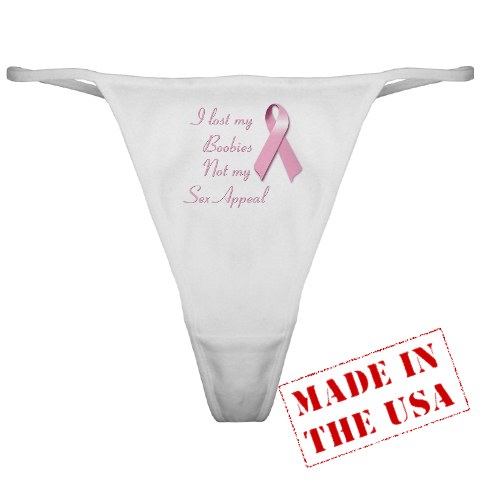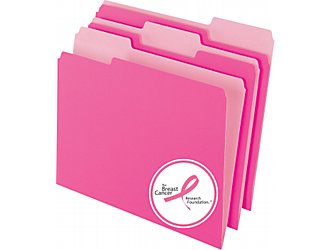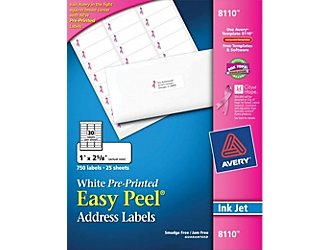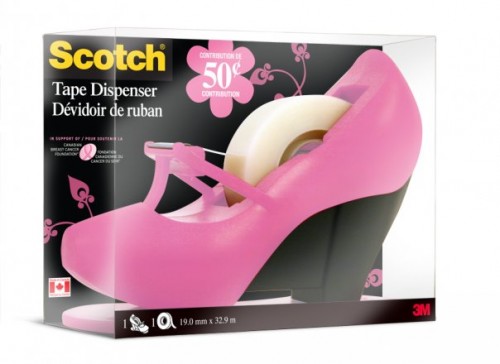October is National Breast Cancer Awareness Month. Accordingly, during October we come across more than the normal number of pink-ribbon-adorned items that variously give a portion of proceeds to breast cancer research, remind women to conduct breast exams, contain supportive messages for breast cancer survivors, or just sort of, you know, support the existence of boobs and oppose cancer. For instance, Alicia, the moderator of Think Before You Pink, found this thong
And Renée Yoxon noticed that Staples, among other office-supply stores, has a lot of pink ribbon products for sale, including pink-ribbon paper, file folder, calculators, daily planners, pens, and, in Canada, a tape dispenser from 3M shaped like a high-heeled shoe:
We’ve posted on the whole issue of breast cancer awareness branding before. And one response that always comes up is, basically, yes, companies may be using breast cancer as a marketing tool to increase sales, but if by doing so they also donate money for breast cancer research or prevention, who cares? By buying pink-ribbon address labels, money goes to fight breast cancer that probably wouldn’t have been donated otherwise, so the net effect is good, right?
In his book Buying In: What We Buy and Who We Are, Rob Walker suggests perhaps not. He summarizes a number of studies that found that “doing good in one area of life provided a rationale to worry less about such things in another” (p. 222). Specifically, feeling they had contributed in some way (by imagining they had agreed to volunteer at a community organization) significantly increased subjects’ preference for “luxury” items. It appears that feeling we have done a good deed makes us feel like we deserve rewards in other arenas, or at least frees us to make decisions we might otherwise be a bit embarrassed about.
Walker connects this research to the wide array of companies that either create a particular product that is slightly more eco- or labor-friendly than their regular line or that donate a tiny portion of profits to a charity of some sort. He suggests that the ability to easily “do good” through consumption — that is, I can choose the pink-ribbon file folders and feel good about myself for being a good citizen — may contribute some money to a particular charity, but may ultimately lead us to be less concerned about the impacts of our other consumption choices. As Walker summarizes the effect,
These various efforts each add just enough options to the miles of retail shelves to give us all an ethical fix — to do our one good shopping deed. Then we can push our basket a little farther down the aisle, letting other rationales take over: Here’s a bargain, here’s a great product…and here, yes, here is something ethical. I’ll take one of those, too. (p. 223)
From this perspective, this type of branding may benefit companies not just by making it more likely we’ll buy the specific product they’ve attached a pink (or red, or yellow, or whatever color) ribbon to, but by satisfying our need to feel like we’re aware, concerned consumers, and thus making us less likely to question the production practices of the other items we’re choosing among.





Comments 32
R — October 26, 2010
I'd be interested in your thoughts on Movember (growing a moustache for the month of November to raise awareness of men's cancers) and if these issues translate directly to a man-specific event.
http://us.movember.com/about/
It's in its infancy and not nearly as well-known as the pink ribbon, but uses many of the same tactics. An interesting aside is the odd branding of participants as gentlemen - one part of the website includes the phrase "A gentleman is, after all, still a man no matter how gentle he is."
RuthAnthropologist — October 26, 2010
I haven't read Walker's book, so I'm wondering if the relationship discussed here is necessarily causal -- does the feeling of having done good in some area necessarily CAUSE a preference for "luxury" items, or could these things be correlated in some other way? E.g., the social rewards for appearing charitable in elite circles, which could explain why people who buy expensive things also do little things that make feel they have "done good" in the world... just saying
Tegan — October 26, 2010
I'd like to point out also that a lot of these products might not even give much to the charity at all.
I used to work in a stationary company which would release an entire product line for Breast Cancer Awareness. The way they presented the products made it sound like you were doing something significant for the cause just by purchasing a single product. It was phrased in such a way that made it sound like an amazing, life-changing investment.
The one product we were told to push cost around £13.
Only 15p of that went to the charity.
If you're going to donate to charity I'd advise doing so directly.
RuthAnthropologist — October 26, 2010
...it seems like a big leap, and also implies that 'doing good' is sort of a zero-sum game, where there's only so much to go around.
To me, the bigger issue with all of this is the neoliberal configuration of ethics as something fundamentally individual and fundamentally practiced through consumption in a capitalist marketplace. To be honest, I care less about branding than about the idea that social change is the responsibility of the individual-as-consumer, rather than the state or the people as a political body.
Cindy B — October 26, 2010
Also, check out: Pink Ribbons Inc. by Dr. Samantha King.
She provides further insight.
Anonymous — October 26, 2010
I find myself quite annoyed by the barrage of Breast Cancer Awareness products and such that are really quite pointless, though I suppose when proceeds are being donated to research and such it's not completely pointless- still, it feels empty.
The only good thing is that everything gets made in pink, which is a color I happen to LOVE.
Leigh — October 26, 2010
Check out this blog post on from starkravingmadmommy
The gist -- Pink awareness made it difficult for her to get a timely mammogram
"F*ck Pinktober and this Motherf*cking Diet Coke Cyst"
http://www.pajamasandcoffee.com/?p=4266
Barbara — October 27, 2010
I wonder sometimes if strategies like this are consumerist methods of keeping us distracted from the larger, more justice-oriented issues. Market forces are all about playing upon our feelings and our impulses. We gratify two at the same time by buying "ethical" products, both our need to shop and our need to do good things. However, having done that, we're not going to go any further because of what the author indicates: We've done our good deed, therefore we don't need to worry about whether it goes far enough. So, why worry about environmental degradation that might tie into breast cancer causes when we've bought the pink-ribbon bottle of wine? Why worry about Western neoimperialist policies in Africa when we've bought Red products at Starbucks and the Gap. We're doing our part and we don't have to reflect on our roles in it or deal with our responsibilities in participating in the systems that make such things possible.
Guest — October 27, 2010
What's being done to prevent it?
giorgos — October 27, 2010
As a way to supplement the critique offered by this post and Rob Walker's book, Slavoj Žižek's short lecture (accompanied by a brilliant animation) First as Tragedy, Then as Farce goes further to, in fact, suggest that a radical transformation of society might be the only meaningful way to collectively alleviate the problems currently addressed by individualistic consumer-driven charity.
Sadie — October 27, 2010
The pinking of consumer products is rediculous. It is such a transparent scam. When you look at the fact that a great deal of these products actually contain chemicals that have been shown to have strong links to causing cancer, or are produced in ways that violate fundamental human rights, I don't know how you can reasonably justify buying them. The whole thing is just a big, icky, pink mess if you ask me.
I'm glad I hate pink.
Wanna do something good? Stop buying crap. Start DOING stuff.
Che — October 27, 2010
Maybe I'm cynical, but it just seems like all this cancer fundraising makes it sound simple. "FInd a cure for cancer!" These organizations (the legit ones at least, like Komen) *DO* fund research - our postdoc is applying for a Komen grant. But I think it does a disservice to the public to say we're going to find A CURE for cancer. Because there's not going to BE a single cure for cancer. Different cancers express different genes more heavily, so you need specific treatments. And once you treat one pathway, the cancer finds another way around that so it can keep growing with the treatment. Can you get rid of someone's cancer? Yeah, but it's a specific, multifaceted treatment for each cancer. YES, funding research is helpful (and also keeps me employed in a breast cancer research lab). But I feel like the message that this stuff gives - a cure for cancer! - makes things sound too simple, and I wonder how that affects people with cancer who aren't really up-to-date on the science. Do they go into it understanding the complexities of treatment? I didn't work in this lab when my mom had breast cancer, and I didn't get how complicated it is. I think the popular fundraising message can be a disservice to people who deal with cancer in their own lives.
Also, a HIGH HEEL? PLEASEEEE. That bugs me in SO MANY WAYS, though it's just an extreme example of the pinkness. Marketing femininity is problematic anyway, but more so when we're talking cancers that make one question her own femininity (losing a breast, having scarring on the breast as my mom did from radiation; or, if we're talking reproductive cancers, I know from non-cancer experience that having a nonfunctional reproductive tract can make one feel less woman).
Bel — October 28, 2010
So, what's the woman who has cervical cancer supposed to wear? A bra that says, "Cancer trashed my twat, but at least I got my tits!"?
Barbara Ehrenreich's book really nails this whole pink thing and how nauseating it all is. So take some Pepto because it's pink and is probably a cure for breast cancer because of that reason.
But I'm embarrassed to admit I kind of like the shoe tape dispenser. But not in pink! I would prefer it in red, so it would match my stapler! :D
Think Before You Pink » A roundup of interesting news from this past week! — October 29, 2010
[...] Sociological Images: Awareness Branding and the Ethical Fix [...]
undergrad RN — November 1, 2010
Breast cancer hype makes me crazy because it both enforces the idea that a breastless woman is less than whole and then argues that they are whole despite being without breasts.
Whatever happened to every other awful kind of cancer? I can think of several offhand that are not nearly so glamorous as the kind that dare touch our favorite body part and are just as deadly.
Guest — February 2, 2012
Well, thanks to Komen's decision to halt funding for Planned Parenthood, perhaps fewer mainstream groups will be supporting the pink ribbon campaign. I wonder what sort of impact its decision will have on the image and recognition of the pink ribbon campaign, of Breast Cancer Awareness Month 2012, and of access to breast cancer screenings.